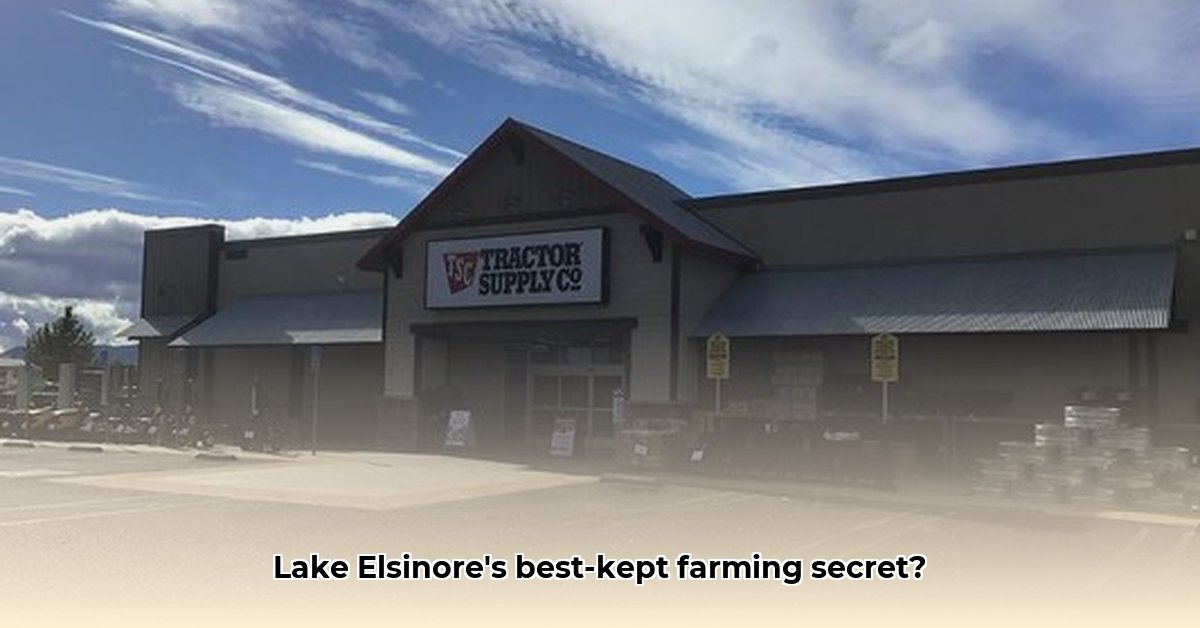
Lake Elsinore Tractor Supply serves as a vital resource for the community, catering to farmers, gardeners, and pet owners alike. Its convenient location and wide product selection have established it as a local hub. However, to ensure continued success and relevance, the store must strategically navigate evolving consumer demands and environmental concerns. This article examines the current landscape, identifies key challenges and opportunities, and proposes actionable steps towards a more sustainable and successful future for Lake Elsinore Tractor Supply. For pet supplies, check out this resource.
Sustainability: A Critical Imperative
The increasing focus on environmental responsibility presents both a challenge and an opportunity for Lake Elsinore Tractor Supply. While the store's current environmental practices are not publicly available, adopting sustainable initiatives offers significant benefits, including enhanced brand image, attraction of environmentally conscious consumers, and potential cost savings. Isn't a positive environmental impact good for business and the community? The lack of readily available information on current environmental efforts highlights a need for increased transparency.
Building a Greener Future: Actionable Recommendations
The following recommendations provide a roadmap for Lake Elsinore Tractor Supply to integrate sustainability into its core operations and enhance its position within the community.
For Lake Elsinore Tractor Supply:
Phased Approach to Sustainability:
Phase 1 (Year 1): Environmental Assessment & Waste Reduction: Conduct a comprehensive environmental review of operations (energy use, waste management, supply chains) to identify areas for immediate improvement. Implement simple yet impactful waste reduction programs, including recycling, composting, and the use of reusable containers. Employee training on sustainable practices is crucial for widespread adoption. This foundational step will provide the data needed to set meaningful goals.
Phase 2 (Years 2-3): Supply Chain Optimization & Transparency: Focus on building transparent and sustainable supply chains. This involves collaborating with suppliers committed to responsible sourcing, exploring options for using recycled materials, and supporting local producers who employ sustainable farming practices. Regularly published reports detailing progress towards sustainability targets will build trust with consumers.
Phase 3 (Years 3-5): Community Partnerships & Continuous Improvement: Forge collaborative partnerships with local farmers and environmental organizations. This could involve joint educational workshops, shared marketing initiatives, or collaborative projects focused on environmental restoration. Ongoing monitoring and adjustments to sustainability strategies based on data and community feedback are essential for long-term success.
For Local Farmers and Gardeners:
Promote Sustainable Agriculture: Partner with Tractor Supply to highlight eco-friendly products and offer workshops on sustainable farming techniques. Consider offering incentives, such as discounts on sustainable products or bulk purchases.
Educational Initiatives: Tractor Supply can play a pivotal role in educating farmers and gardeners about water conservation, reduced pesticide use, and other crucial sustainable practices.
For Consumers:
Clear Labeling & Sustainable Packaging: Implement clear labeling of eco-friendly products and gradually transition to recyclable or compostable packaging options. Transparent communication provides the information consumers increasingly demand.
Brand Building: Develop a strong brand identity that emphasizes the store's commitment to sustainability, highlighting the positive impact on both the environment and the local community.
For Local Government:
Collaboration & Incentives: Collaborate with local government to participate in environmental initiatives and secure incentives for businesses adopting sustainable practices. Government support is crucial for widespread adoption of sustainable agriculture.
Sustainable Land Use Planning: Work with the local government to incorporate sustainable land use planning into the broader regional strategy, supporting environmentally sound agricultural practices.
Risk Assessment and Mitigation
Lake Elsinore Tractor Supply faces several potential risks, which require proactive mitigation strategies. The following matrix highlights key risks and corresponding mitigation actions:
| Risk Factor | Likelihood | Impact | Mitigation Strategy |
|---|---|---|---|
| Supply chain disruptions | Medium | High | Diversify suppliers, enhance logistics, build robust contingency plans, secure alternative sourcing. |
| Shifting customer preferences | Medium | Medium | Conduct market research, adapt product offerings, proactively engage with customers, emphasize sustainability. |
| Online retail competition | High | Medium | Enhance in-store experience, focus on personalized customer service, explore e-commerce options. |
| Negative environmental impact | Low | High | Proactive implementation of sustainable practices, robust environmental monitoring, transparent reporting. |
Regulatory Compliance
Staying informed about and adhering to all relevant regulations concerning agriculture, environmental protection, and animal welfare is paramount. Regular review of changing legislation ensures continued compliance and minimizes potential legal issues.
Conclusion: Growth and Sustainability in Harmony
By proactively addressing sustainability concerns and actively engaging with the community, Lake Elsinore Tractor Supply can strengthen its position as a vital local resource and foster long-term growth. This approach benefits not only the store but also the entire community, creating a vibrant and sustainable future for all. The success of this initiative hinges not only on the store's commitment but also on the active participation and collaboration of all stakeholders.